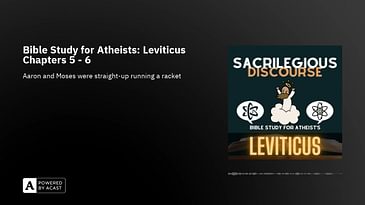Join us on DISCORD: https://discord.gg/8RwwMrb5zK
Skip the ads by joining Acast+ https://plus.acast.com/s/6331d364470c7900137bb57d
Thank you for stopping by Sacrilegious Discourse - Bible Study for Atheists!
Check out these links for more information about our podcast and merchandise:
Our Homepage: https://sacrilegiousdiscourse.com/
Help support us by subscribing on Patreon: https://www.patreon.com/sacrilegiousdiscourse
Leviticus 5-6 is a continuation of the laws given to Moses on Mount Sinai. These chapters focus on various types of sacrifices and offerings.In Chapter 5, the Israelites are instructed to make sacrifices for various sins, such as perjury, sacrilege, and negligence. The specific sacrifice required depends on the severity of the sin. For example, someone who commits perjury must bring a ram or a ewe as a sacrifice. Someone who is guilty of sacrilege must bring a bull as a sacrifice.
Chapter 6 deals with burnt offerings, grain offerings, and fellowship offerings. Burnt offerings are made to God as a sign of devotion. Grain offerings are made to God to express gratitude for His blessings. Fellowship offerings are shared between the Israelites and God.As an atheist, I find the laws in Leviticus 5-6 to be quite interesting. They provide a glimpse into the religious beliefs and practices of the ancient Israelites. However, I do not believe that these laws are relevant to modern society. I believe that everyone should be free to practice their religion in whatever way they see fit, as long as it does not harm others.
I also find it interesting that the laws in Leviticus 5-6 focus so much on sacrifices and offerings. This suggests that the ancient Israelites believed that they could appease God by making these offerings. However, I do not believe that God needs to be appeased. I believe that God is a loving and compassionate being who does not require sacrifices or offerings from us.
Overall, I find the laws in Leviticus 5-6 to be interesting, but not relevant to modern society. I believe that everyone should be free to practice their religion in whatever way they see fit, as long as it does not harm others.






